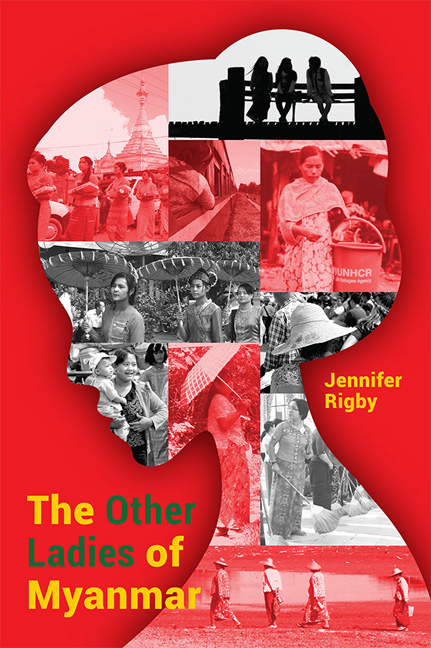Book contents
- Frontmatter
- Dedication
- Contents
- Preface
- Acknowledgements
- Introduction
- Timeline
- 1 The Activist: Cheery Zahau
- 2 The Feminist Buddhist Nun: Ketu Mala
- 3 The Survivor: Mi Mi
- 4 The Businesswoman: Yin Myo Su
- 5 The Environmental Campaigner and Princess: Devi Thant Cin
- 6 The Artist: Ma Ei
- 7 The Refugee Sexual Health Nurse: Mu Tha Paw
- 8 The Rohingya and Human Rights Champion: Wai Wai Nu
- 9 The Farmer: Mar Mar Swe
- 10 The Pop Star: Ah Moon
- 11 The Politician: Htin Htin Htay
- 12 The Archer: Aung Ngeain
- Conclusion
- About the Author
10 - The Pop Star: Ah Moon
Published online by Cambridge University Press: 08 June 2019
- Frontmatter
- Dedication
- Contents
- Preface
- Acknowledgements
- Introduction
- Timeline
- 1 The Activist: Cheery Zahau
- 2 The Feminist Buddhist Nun: Ketu Mala
- 3 The Survivor: Mi Mi
- 4 The Businesswoman: Yin Myo Su
- 5 The Environmental Campaigner and Princess: Devi Thant Cin
- 6 The Artist: Ma Ei
- 7 The Refugee Sexual Health Nurse: Mu Tha Paw
- 8 The Rohingya and Human Rights Champion: Wai Wai Nu
- 9 The Farmer: Mar Mar Swe
- 10 The Pop Star: Ah Moon
- 11 The Politician: Htin Htin Htay
- 12 The Archer: Aung Ngeain
- Conclusion
- About the Author
Summary
BURMESE POP star Ah Moon is reading out her social media messages as we sit in the Yangon traffic.
“Bitch, slut, get out of the country,” she says, scrolling down. “And it's just because I'm wearing what I want. But when people call me things because of what I'm wearing, or showing skin, I think they need to see that I'm a human, a woman, and showing your body as a woman, and showing your abilities, and raising your voice — there's nothing wrong with that.”
Her jaw juts defiantly, and we pull away from the traffic in her car.
“I'm in a situation where I push boundaries every day,” she says. “It's not because I'm not respectful to people, it's because I want to show people from Myanmar that just because you are from this country, you don't need to box yourself in. You can be out of the box, you can look at the outside world, and I think catching up is not a wrong thing.”
Ah Moon, twenty-five, is one of Myanmar's leading pop stars. Think of her as the Beyoncé of Destiny's Child, or the Harry Styles of One Direction — her career started in a talent show, then a girl band (one of Myanmar's first), and she has emerged from that as her own woman, with a string of hits under her belt, a film, and more than a million followers on Facebook.
Apart from that you can't really think of her like Harry or Beyoncé, because she's actually far more revolutionary than that.
Under the military junta, making music in Myanmar was effectively banned, and things have been very slow to change since then. While there were some brave acts out there who tried to produce original sounds, in the main, pop music was made up of Burmese copies of Western hits called copy tracks, for many years. Even then, censorship was everywhere.
When a military-backed civilian government took over from the generals in 2011, things improved, although not immediately. Ah Moon's former group — the Me N Ma Girls — remember celebrating because they were allowed to wear coloured wigs in one of their videos.
- Type
- Chapter
- Information
- The Other Ladies of Myanmar , pp. 98 - 107Publisher: ISEAS–Yusof Ishak InstitutePrint publication year: 2018



